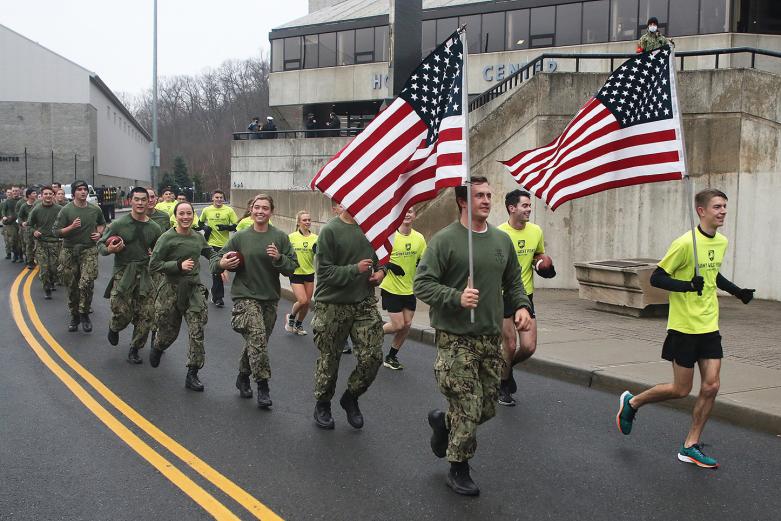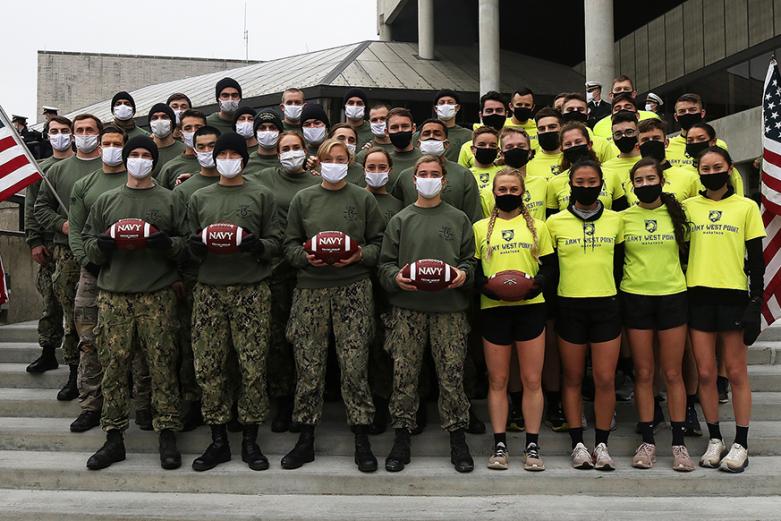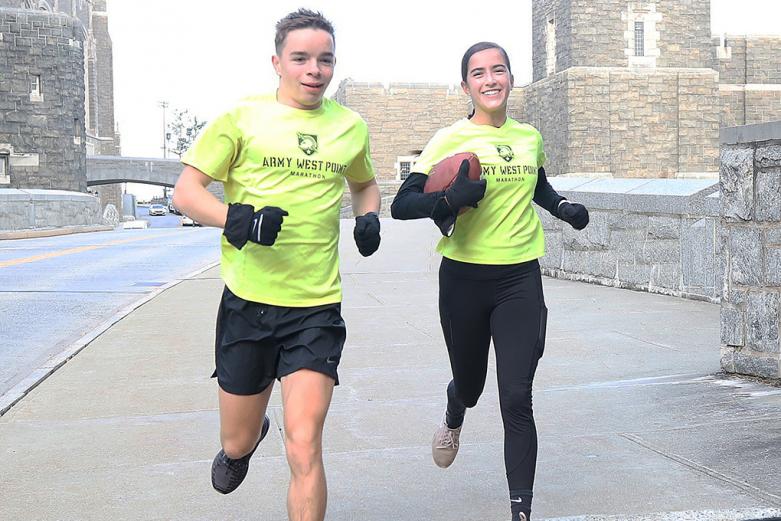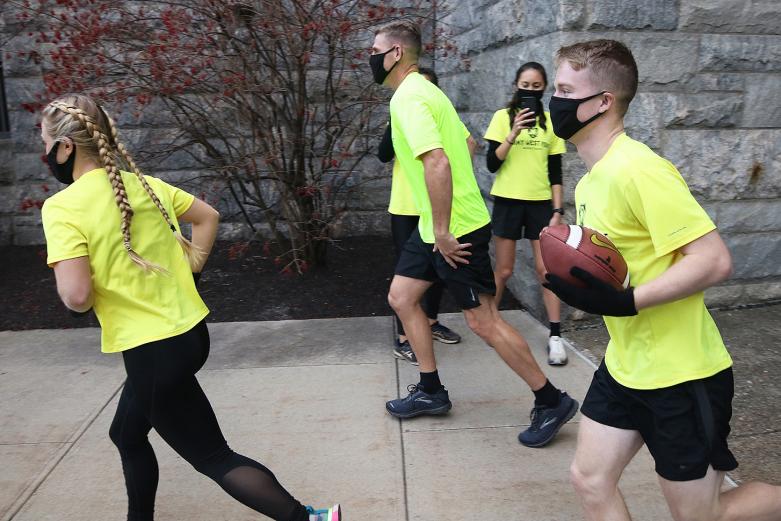The tradition of the Army-Navy Ball Run has been ongoing since the early 1980s. This year, the Army West Point Marathon team was scheduled to trek the game ball the approximately 170-mile route it takes to the "City of Brotherly Love," which is the regular home for "America’s Game," the Army-Navy Game. However, with the COVID-19 pandemic still posing a serious threat, Saturday’s game was moved to the U.S. Military Academy for safety concerns and when the announcement came a little over a month ago of the location change, the cadet leaders of the marathon team came up with a concept to continue the ball run.
Class of 2021 Cadets Chase Hogeboom, the cadet-in-charge of the ball run, and Garrett Burnett, marathon team captain, worked with a staff of team members and oversaw the entire operations, respectively, to plan the event on the fly.
"We knew for a while that we would not be able to have a traditional ball run," Maj. Samuel Herbert, officer-in-charge of the Army West Point Marathon team and Department of Systems Engineering executive officer, said. "We immediately started planning for some type of ball run once we found out the game was going to be played here."
Herbert said the cadet leadership planned, resourced and came up with the concept of a 24-hour endurance challenge.
"They saw it through from start to finish, including putting together products and risk assessments to be approved by the academy senior leadership so we could execute the plan," Herbert said.
The plan they devised was a 10-kilometer route around West Point throughout the 24 hours, then included a 5-kilometer joint esprit de corps run with the U.S. Naval Academy’s 13th Company to complete the ball run.
"The last five kilometers, we chose a joint run with Navy’s 13th Company, where the route would start and finish at Michie Stadium," Herbert said. "It took us through the most historic parts of West Point, including The Plain through the Cadet Area."
Fifteen members of the Army West Point Marathon team took part in the run where the team was split up into three, eight-hour shifts and each member of the squad had a chance to run for two-to-four hours each, an hour at a time, Herbert said. Academy leadership, including Department of Physical Education director Col. Nicholas Gist and Commandant of the Corps of Cadets Brig. Gen. Curtis A. Buzzard, participated with the team during the run.
"During daylight hours, the two-person teams could run anywhere on West Point that they choose, but they just had to brief the shift leader," Herbert said. "But, once it got dark, we had the dedicated 10-kilometer route that was on The Plain level for safety reasons to ensure we knew exactly where the cadets were running and it was along well-lit roads, but mostly sidewalks."
The plan was to run as many miles as possible during the 24-hour period. The team completed more than 400 miles within those hours, which is more than double the miles it would take to run the game ball to Philadelphia.
For everyone who couldn’t come to West Point for the Army-Navy Game experience, the marathon team put out a challenge, 10 miles in 10 days, to involve anyone who wanted to take part in the enthusiasm of the ball run.
The team had three different methods to count how many people participated and the number of miles run — the Strava fitness App, a U.S. Corps of Cadets spreadsheet for cadet runners and a form that could be filled out by the Army community on the Army-Navy Ball Run webpage. Class of 2021 Cadet Sara Scales, marathon team member, said that as of 3 p.m. Friday, 265 runners had participated, running a total of 2,456 miles. Class of 2021 Cadet Alexander Block, marathon team member, said a final total of more than 300 runners participated running a total of more than 3,100 miles from all the compiled information.
"I think it is pretty inspiring to know that other people, our graduates and fans, were inspired by us and were going out and running," Class of 2024 Cadet Daniela Etzel, a marathon team member from Freehold, New Jersey, said. "I know my dad (Josh, USMA ‘97 graduate) did it. He ran 10 miles last weekend, and he was excited to say he was a part of the team — I think it’s cool. Especially in this environment, the COVID environment, to extend challenges and have people be a part of things even if they can’t be here, to have them still be a part of it in some sort of way is amazing."
Class of 2024 Cadet Wesley Anderson, marathon team member, agreed with Etzel’s assessment and added, "It is really inspiring and encouraging to see others doing this outside of just us, it gives us a sense of purpose. It inspires us to work harder and it makes it exciting to do this."
The other special part of the experience was finishing the ball run with their academy brethren that added enthusiasm to the day. It has never happened previously as both groups run from their respective academy with the game ball to the game’s location and don’t cross paths until running the ball into the stadium on game day. It gave that added bond that despite being adversaries on the fields of friendly strife, the academies still are one when it comes to the future of fighting on the battlefields/seas for our nation.
"Despite the competitive nature of the Army-Navy Game, running the final 5K of the relay with their 13th Company demonstrated the mutual respect that the academies have for each other," Block said. "Our commitment to service remains the greatest tie between us, but we are also joined by shared experiences, lifestyles and perspectives. I think that the 5K was symbolic of this shared respect and the commitment to service that unifies us."
Anderson added about the experience, "This whole event is a lot bigger than just a rivalry, it’s about showing the cohesion of the two academies. That is really important for the nation to see."
With Etzel and Anderson both being plebes, they have yet to experience the ball run on the roads to Philadelphia or the Meadowlands of New Jersey, which is where next year’s Army-Navy Game will take place if circumstances in the world change. As for their first full semester at West Point where they couldn’t leave post and all events were performed virtually, there is an excitement of being able to venture out for future events, especially next year’s Army-Navy Ball Run.
"Next year, when we go to the Meadowlands and run the hundreds of miles on the open road, it will feel like a sense of accomplishment," Anderson, a Tampa, Florida, native whose dad, Gregory, is a USMA ‘91 graduate, said. "But, to have it here this year and to see all the work (our cadet team leadership) put into this, it was truly amazing."
It has been a tough semester for the marathon team members, as it has been for the whole Corps of Cadets, being restricted to post, missing out on a trip to Greece, among other competitions at different locales.
However, they have overcome the circumstances and have risen to the occasion by doing great things.
"This year, the team pushed through really hard with its training progression that culminated in a marathon where they all ran in the West Point area and training areas," Herbert said. "They did a 10-mile virtual race against Air Force and beat Air Force … so not only did our team win the ROTC and service academy divisions at the Army Ten-Miler, that same race we used our times against Air Force and beat them head-to-head for the competition. They received their ‘Stars’ for beating Air Force earlier (Friday)."
Herbert added how proud he is of their academic achievements as they have some gifted students on this team, but then put it altogether in training and competition during a pandemic.
"I’m proud of the hard work they put in this semester, but especially this semester in the face of a lot of adversity and things that could have taken their focus away from running," Herbert said. "However, they have all been able to rise above that and push themselves incredibly hard to where several of them got personal bests on their 10K, 10-mile, half marathon and marathon times."
All their hard work led to their biggest moment of the fall semester, running the game ball into Michie Stadium on gameday.
Two members of the squad received the ultimate honor to present the game ball on the field prior to the start of the game, Block and Class of 2022 Cadet Emily DiNallo. They both earned the right by recording the best male and female team marathon times during the fall.
Both Block and DiNallo were honored to have the chance, as Herbert said, to have the once in a lifetime opportunity to deliver the game ball on the field at Michie Stadium for the Army-Navy Game.
"I was incredibly humbled to have the honor of running the game ball onto the field," Block said. "Our team amazes me every day with their passion, diligence and commitment to each other. I’m so fortunate to be a part of the team and, to me, running the ball onto the field symbolized a semester of perseverance and team unity."
From her perspective, DiNallo added, "Being selected as one of two marathon team members to run the ball onto the field was such an honor because we’re chosen to represent the entire USMA Corps of Cadets. Capping off such an unpredictable year by playing the Army-Navy Game at Michie Stadium for the first time since 1943, it was very rewarding for us … standing alongside my teammate to hand off the game ball was a surreal experience because we got to represent the marathon team. This experience concluded all the hard work that the Corps, the marathon team and the football team put in this year. This semester has been unlike any other and to have this opportunity to finish a long ball run parallels the long semester we all have endured."
The end result of the football game was Army defeating Navy, 15-0, which was the Black Knights first win against the Midshipmen at West Point in the four times played there in the 121-game history of the matchup. Nonetheless, the marathon team members crave the day they can get back on the road and get that feeling of running into a stadium filled with fans cheering them on as they have experienced in past years.
"You can definitely feel the energy, especially the cadets and midshipmen," Scales, who ran the ball into Lincoln Financial Field last year in Philadelphia, said. "It is a bit interesting because we actually run the game ball to the stadium the day before and it’s completely empty. But, on gameday as a team, once we step on the field and there are 60,000 to 65,000 people cheering us on — it’s incredible."



